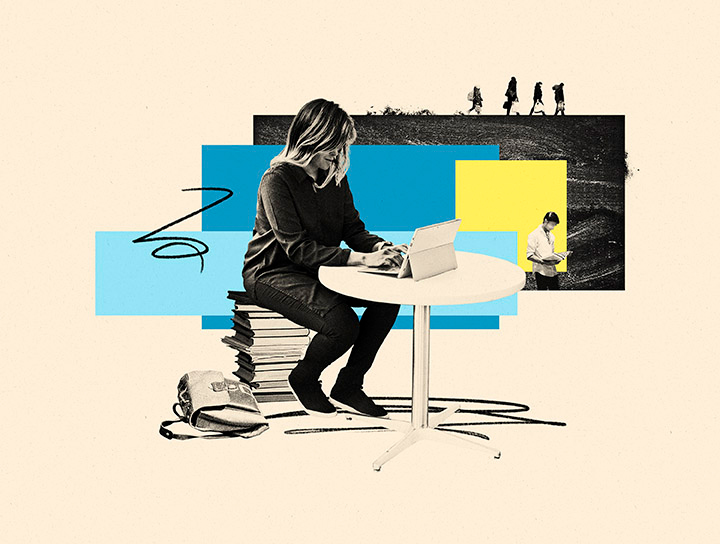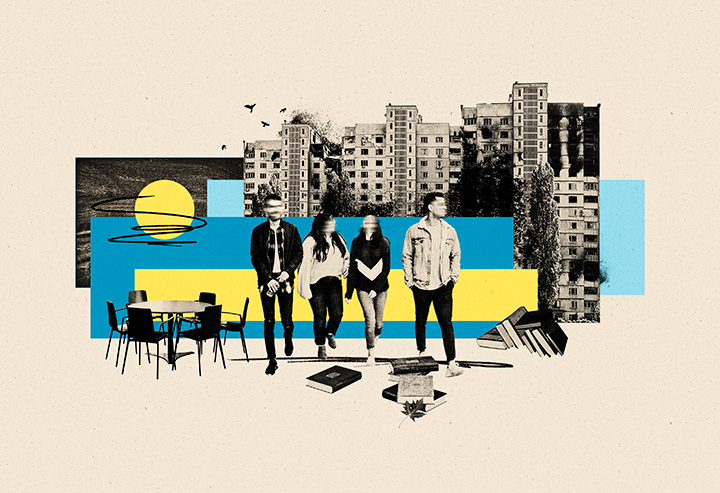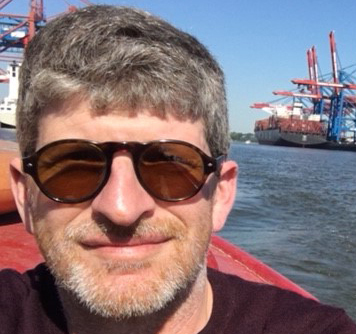Shortly after Russia invaded Ukraine last February, Olha Maliienko and her husband drove west to stay with his grandparents. The couple, married only six months earlier, lived near the eastern Donbas region and knew it would quickly become a Russian target. When Maliienko’s husband left to enlist in the army, she returned home, spent several nights in a bomb shelter and then decided she needed to leave the country.
Maliienko, 27, who had worked as a marketing manager before she left Donbas, reckoned she could find a university abroad where she could complete her doctoral work in applied mathematics. She packed a bag, got in her car and spent 40 hours in a massive traffic jam on the way to the Polish border, where she waited another 16 hours to get through.
Eventually arriving in Warsaw, she set to work searching for universities and found programs in Taiwan and Israel. Ultimately, she opted for a U of T summer program for Ukrainian students being offered by the department of computer science and the Vector Institute. “Canada,” she says, “was the safest place for me.” She bought a $200 one-way ticket and arrived in Toronto in May.
Last March, after the war began, U of T put out a call for donors to help Ukrainian students continue their education here. The request brought in more than $4 million, including a $3.2 million gift from the Temerty Foundation. The Temerty gift has so far supported 20 Ukrainian students through an exchange between U of T’s Faculty of Arts and Science and the National University of Kyiv-Mohyla Academy, according to Gwen Burrows, assistant vice-president for international engagement and impact; up to 200 more students are expected by early 2023.
The remaining funds raised will support the university’s Scholars-at-Risk program, which since 2016 has admitted both undergraduate and graduate students fleeing turmoil and violence in their home countries, offering up to $10,000 toward tuition and other costs, as well as other services. (An earlier version of the program, only for graduate students, was launched by Massey College and the School of Graduate Studies in 1999. Over the years, it has supported dozens of students from countries such as Azerbaijan, Iran, Syria, Venezuela and Zimbabwe.)
Because the university welcomes students and faculty from around the world, assisting those who have had their academic careers and freedom interrupted by war is an extension of U of T’s broader outlook, explains Burrows. “It’s an important part of our international engagement.”

Roman (who asked that his real name not be used), 21, first heard about the opportunity to attend U of T on a group chat in March. He had been living in Kyiv early in the war, then moved to western Ukraine with his family as the fighting intensified, eventually returning to Kyiv. He swiftly completed U of T’s requirements online and secured an acceptance before the Ukrainian government moved to prevent fit adult males from leaving. But the lengthy wait at the border was excruciating because there was no guarantee that the guards would allow him to depart. “I don’t know why, but I got lucky,” he says.
To flee war is to be caught in a kind of geopolitical limbo, physically in one place and emotionally in another. With the Ukrainian students who have come to U of T, the transition, in some ways, has been relatively straightforward. Many are fully conversant in English. As well, members of the local Ukrainian community (and other volunteers) have mobilized to provide everything from apartments to household utensils. “They tried to make our life as easy as they can,” says Maliienko.
Still, the sense of separation is intense, and the students’ smartphones provide a steady diet of news from home and other reminders, including air raid alerts they never deleted. “Being not home is hard,” Roman says. “You feel homesick really quick.”
Maliienko, who spent the summer living on the St. George campus in residence, says her own sense of dislocation is compounded by the fact that her husband, who is now fighting the war, can only contact her once a week, via Elon Musk’s satellite internet service Starlink.
Through the Summer Program for Students from Ukraine, however, she and other Ukrainian students have received a steady diet of practical information about jobs, accommodations and the city’s social offerings, among other topics. There have been meetings with potential employers and even a camping trip. “This schedule helped me not to think all the time about Ukraine and missing my husband,” she says.
At U of T Mississauga, Khrystyna Radchenko, 20, has been working through a summer program in computer science, and is considering extending her time here by a year. “My mom is asking me to stay longer just to be safe,” she says, noting that, beginning in October, the Ukrainian government will restrict women with certain specialties or professions from leaving the country.
Even six months ago I was thinking of building a family. But now I’m not sure.”
Roman, who had considered studying abroad before the war began, was aware of U of T’s strength in research. After he arrived, he sought out computer science professors with the goal of pursuing research in coding, including machine learning.
Dariia Kucheruk, who hopes to finish her computer science degree at U of T, is also focused on machine learning, and its application in fields such as health care. A resident of Odesa, she had been travelling with her parents in Africa when the war began, and ended up in Istanbul for two months after all flights into Odesa were cancelled.
Like Roman, she had thought about studying abroad before the war and wanted to end up in a university with faculty who were the best in their field. But, she notes, she never expected this to happen because of a war, adding that she didn’t think she had the strength to leave her homeland: “I didn’t ever imagine I could do this.”
Maliienko wanted to go home this fall and return to U of T later to finish her PhD, but these decisions, like so much else for millions of Ukrainians, are on hold as the war grinds on. “Even six months ago, I was thinking about building a family,” she says, “but now I’m not sure.” For the moment, she’s focused on her studies and adjusting to life in Toronto bit by bit. Reflecting on her current situation, she muses: “People are stronger than they think.”
ABOUT SCHOLARS AT RISK
- The initiative is modelled after the Writers-in-Exile program, created by Massey College and PEN Canada in 1995
- Ballet star Mikhail Baryshnikov was an early donor to the program
- The first participants were a writer from Ethiopia and a professor from Iran
- The program expanded in 2016 during the Syrian refugee crisis






